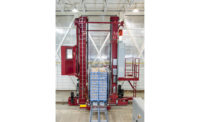E-commerce has brought many benefits to the B2B foodservice industry, including convenient self-service ordering processes, lower overhead costs and more efficient operations, to name a few. But, cloud-based e-commerce can also improve customer loyalty by providing customer portals with rich self-service features that drive operational efficiencies.
The ability to quickly accommodate for buyer demand is now more crucial than ever, as competitors and advances in technology raise the standards across the industry. With buyers expecting 24/7 access, suppliers need to be always-on and integrate sales capabilities and customer service into a seamless experience.
The flexibility and scalability of the cloud is what sets these solutions apart from traditional platforms. The rigid and complex nature of traditional systems typically require long roll-out periods and significant IT expertise to update, given their on-premise, ERP set-up. However, the cloud can easily integrate with new technologies and partners that can provide real-time updates, as well as holistic product and buyer information.
Adaptive cloud-based platforms have helped suppliers quickly adjust to evolving buyer expectations by enabling organization’s to personalize interactions with buyers, anticipate potential operating and delivery inefficiencies and ultimately improve fill rates. With high fill rates, suppliers not only increase customer trust and loyalty, but also gain a competitive edge when attracting new buyers.
Cloud technology can improve supply chain inefficiencies and overall buyer experiences in the following ways:
Provide personalized, role-based interactions with buyers
When it comes to purchasing for the foodservice industry, one size does not fit all. Every restaurant or retailer has different needs for the buying process, and the best-in-class suppliers ensure each interaction is tailored to meet them. Cloud technology enables businesses to collect data from across an organization to create a more in-depth view of the customer that facilitates personalized experiences. It also helps businesses communicate between departments to make sure that each person within the organization has access to the right data to do their jobs.
An owner of a franchised restaurant, for example, benefits from a simple experience that allows him/her to easily reorder the same items on a routine basis. But, a farm-to-table restaurant manager needs a shopping experience that allows her to browse different ingredients and products on a seasonal basis.
With this in mind, suppliers must provide personalized, role-based interfaces for each user. Managers should be able to set varying levels of access on purchasing portals based upon different roles—an employee might only need to be able to check the status of an order, for instance, while a manager should have authority to purchase. Others benefit from access to higher-level insights that enable them to improve their businesses, like information about which products are underselling or which are high performers. By personalizing experiences to meet unique needs, suppliers will find higher engagement and strengthened customer loyalty.
Anticipate low stock and suggesting alternatives for out-of-stock products
It is difficult to accurately anticipate demand for every product in a supplier’s inventory. Food festivals, sporting events, dining trends, seasonal changes, crop yields and more can have drastic effects on demand, but the combined factors are too complex to predict, unless businesses are equipped with the machine learning technology to handle it.
Employing the right strategies to avoid insufficient stock levels require a good analytics program that can look at historic purchases to predict future purchase patterns. By using powerful algorithms that can make sense of mountains of data, cloud-based AI technology enables suppliers to predict what products might be in higher demand or shorter supply and plan ahead. This guides purchasing and price decisions, and allows suppliers to make contingency plans for inventory that might be hard to source at any given time. Fast and accurate analytics also proactively share trending products and even make recommendations to buyers. This provides unique opportunities to cross-sell products and enhance revenue and client satisfaction.
Every business needs a plan of action for when products are unavoidably out of stock. The best way to keep a buyer happy is to suggest similar products for when inventory is unavailable. For example, a buyer ordering tuna might be offered fish from another region or fishery, or even the same product in different quantities (like three 4-pound containers instead of one 12-pound container). If alternative options aren’t available, AI technology can even suggest products from other partners or other distributors that fill the order. This seems simple, but it’s crucial to give buyers options when inventory shortages occur to keep customer satisfaction and loyalty high.
Establish a level of protectionism
It’s important for B2B foodservice providers to establish a means to protect their business. In fact, this is a big reason to avoid low stock, so that buyers don’t turn to a similar provider who can easily take their business. Ensuring that their business continually adapts to incorporate advanced technology and provide the variety of offerings that users have come to expect is essential.
Features that can be found in the B2C world, such as same-day delivery and self-service, help these businesses engage with customers in a more efficient way. As B2B buyers start to expect similar experiences to those in their B2C lives, businesses need to recognize that speed and convenience are essentials to their business as well. If they don’t provide these offerings, they risk losing to competitors who can provide the rapid delivery and convenience that buyers crave.
For businesses that aren’t already transitioning to the cloud is one effective way to establish a level of protectionism. In order for B2B foodservice providers to quickly adapt to changing needs and integrate with third-party technologies that can expand on current functions, cloud capabilities are necessary. Having this level of flexibility means that organizations can scale their offerings quickly and stay competitive enough to keep up with the market.
While commerce technology has evolved, the end game hasn’t changed. Suppliers need reliable fill rates and excellent customer service to develop loyalty and trust with business buyers. Cloud-based technology allows foodservice suppliers to serve the customer more effectively through personalized communications with individual buyers, access to real-time data and the tools to analyze it and heightened agility to adapt to changing needs. This investment is a must-have for suppliers to remain competitive in a growing marketplace.



